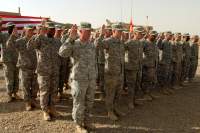Biden orders 3,000 Reservist to be ready for deployment to Europe

President Joe Biden has authorized the military to call up 3,000 reserve troops to support operations in Europe after tens of thousands were sent there last year after Russia’s invasion of Ukraine, a top general said Thursday.
Although it is not clear whether Defense Secretary Lloyd Austin plans to actually deploy these reservists anytime soon, the move suggests that the U.S. military’s training mission in Europe, along with the deployment of several new brigades after the invasion, has stretched active-duty forces.
“This reaffirms the unwavering support and commitment to the defense of NATO’s eastern flank in the wake of Russia’s illegal and unprovoked war on Ukraine,” Lt. Gen. Douglas Sims, the director of operations for the Joint Staff, told reporters on Thursday.
While the move gives the military’s European Command “greater flexibility” to defend the continent, it will not change the actual force levels in Europe, Capt. Bill Speaks, a spokesperson for U.S. European Command, said in a statement.
The president’s order also, for the first time, designates Operation Atlantic Resolve, the U.S. effort in Europe, as a contingency operation, which allows the Pentagon to call up reserve forces and implement sped-up acquisition authorities to supply those troops with equipment.
The designation not only allows the president to mobilize reservists but also ensures they are paid and supported as active-duty troops. It also provides support for families and dependents of any reservists who might be deployed.
The U.S. rushed 20,000 more troops to Europe after Russia’s invasion, bringing the total to over 100,000 on the continent. That includes new rotations of 10,000 troops in Poland, which has emerged as a critical hub for supporting and supplying Ukraine.
The potential call-ups come on the heels of the NATO summit in Lithuania this week, where allies pledged to make 300,000 troops ready for rapid deployment within 30 days or less. It’s a tall order for the 31-member alliance whose individual members struggle with equipment and troop readiness after decades of skimping on military funding.
The news also comes as Ukraine continues to hammer away at Russia’s main defensive lines in the Donetsk and Zaporizhzhia regions. Although senior Pentagon officials express hope that Kyiv’s forces will recapture more significant territory soon, they say progress has been slower than hoped.
New American cluster bombs have arrived in Ukraine after the Pentagon announced the controversial decision to send them last week, Sims said on Thursday. Officials say they believe the new weapons will prove more effective on the battlefield against dug-in Russian positions and concentrations of troops and armored vehicles.
Read the original article here:




